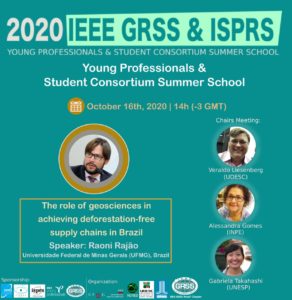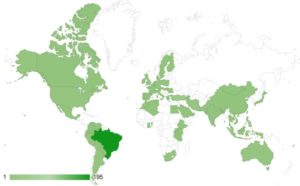Lecture on October 16, 2020. Please join!
Special Lecture: The role of geosciences in achieving deforestation-free supply chains in Brazil
Summary. In the increasingly polarized international political arena, it has become difficult to find common ground to solve Brazil’s ongoing environmental crisis, which has global as well as local implications. International buyers of Brazil’s agricultural commodities have raised concerns about products that are contaminated by deforestation (i.e., deforestation occurred during the process of producing the product) (text S12). European Union (EU) criticism of the Brazilian government bolsters demands to boycott Brazilian products and to withhold ratification of the trade agreement reached in 2019 between the EU and Mercosur, the South American trade bloc. Among the concerns is that increasing greenhouse gas (GHG) emissions from deforestation and forest fires in Brazil could cancel out EU climate change mitigation efforts. The Brazilian government and agribusiness contend that national laws ensure high conservation standards, and hence trading bans should not include legally authorized deforestation (1). Here, we address the interlinkage between illegal deforestation in the Amazon and Cerrado—the largest Brazilian biomes with the highest rates of deforestation—and EU imports of Brazil’s soy and beef, the country’s major agricultural commodities (table S9). Although most of Brazil’s agricultural output is deforestation-free, we find that 2% of properties in the Amazon and Cerrado are responsible for 62% of all potentially illegal deforestation and that roughly 20% of soy exports and at least 17% of beef exports from both biomes to the EU may be contaminated with illegal deforestation. Raising awareness is important to press Brazil to conserve its environmental assets and to promote international political will for cutting telecoupled GHG emissions. This could be achieved, for example, through the environmental safeguards of the Mercosur-EU trade agreement, which require EU imports to comply with the export country’s legislation.
About the Speaker
Raoni is a professor in Social Studies of Science at the Department of Production Engineering at UFMG – Federal University of Minas Gerais. He has a bachelor’s degree in Computer Science (Laurea in Informatica) from Universita degli studi di MILANO-BICOCCA (2005), MRes in IT, Management & Organisational Change, and Ph.D. in Organisation, Work and Technology, both from Lancaster University (2011). Raoni’s research focuses on the relation between science, technology, and policy, with a particular emphasis on environmental policy evaluation and the study of the role of ICT (information and communication technologies) in deforestation control policies and payment for environmental services. He has collaborated with the United Nations Development Programme (UNDP), German Technical Cooperation (GIZ), and Amazon Environmental Research Institute (IPAM). At the moment he is the principal investigator of two research projects funded by CNPq and FAPEMIG.
REGISTER HERE! and help us to FILL the GAPS (See IMAGE BELOW)


